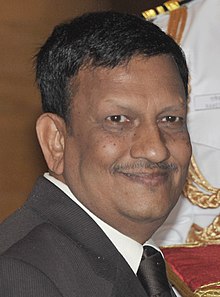S. K. Shivakumar
| S. K. Shivakumar | |
|---|---|
 | |
| S. K. Shivakumar in 2015 | |
| Personal details | |
| Born | 1953 Mysore, Mysore State, India |
| Died | 13 April 2019 (aged 66) Bangalore, Karnataka, India |
| Nationality | Indian |
| Awards | Padma Shri (2015) Karnataka Rajyotsava award (2008) |
S. K. Shivakumar (1953 – 13 April 2019) was an Indian scientist from Karnataka state who worked at the Indian Space Research Organisation (ISRO) centres. He was awarded the Padma Shri, the fourth highest civilian award of India, in 2015.
Early life and education[edit]
Shivakumar was born in 1953 in Mysore in Mysore State (now Karnataka), India. He earned a BSc from Mysore University followed by a BE in Electrical Communications Engineering and an MTech in Physical Engineering from the Indian Institute of Science, Bangalore. He received PhD in Electronics from Kuvempu University in 2014.[1][2]
Career[edit]
He joined the Indian Space Research Organisation (ISRO) and started his career at its ISRO Telemetry, Tracking and Command Network (ISTRAC), Sriharikota in 1976. He later worked in its Indian Space Research Organisation Satellite Centre (ISAC) from 1978 to 1998.[2] He was the project director for the development of the 32-metre (105 ft) dish antenna of the Indian Deep Space Network which is used for telemetry for the missions such as the Chandrayaan-1, India's first lunar exploration mission and Mangalyaan, India's first interplanetary mission.[1][3][4]
He was involved in several satellite missions such as Bhaskara, Indian National Satellite System (INSAT), Ariane Passenger Payload Experiment (APPLE) and Indian Remote Sensing Programme (IRS). Shivakumar was the mission director of the IRS-1B and IRS-1C satellite missions.[2] He also served as the director of the ISTRAC between September 1998 and November 2010.[1][2] Shivakumar was later the associate director of the ISAC from November 2010 to June 2012 and director of the program from July 2012 to March 2015.[1] As of 2019, he was serving as chairman of Karnataka Science and Technology Council.[5]
Death[edit]
He died on 13 April 2019 at the age of 66 in Bangalore and was cremated at the Banashankari Crematorium.[2][5] The cause of death was reported to be post-hepatic jaundice.[2]
Awards[edit]
- Padma Shri, the fourth highest civilian award of India, in 2015[6][7]
- Karnataka Rajyotsava Award (2008)[7][8]
- Nadoja Award (2013)[9]
- Honorary Doctorate (DSc) by the Mysore University[7]
References[edit]
- ↑ 1.0 1.1 1.2 1.3 "Dr. S K Shivakumar". www.isac.gov.in. Retrieved 15 April 2019.
- ↑ 2.0 2.1 2.2 2.3 2.4 2.5 "Former Isro scientist SK Shivakumar dies at 66". The Times of India. 14 April 2019. Retrieved 15 April 2019.
- ↑ "The men behind the mission". NDTV. 22 October 2008. Archived from the original on 26 October 2008. Retrieved 31 October 2008.
- ↑ "Dr. Shivakumar is ISAC's director". The Hindu. 7 July 2016. Retrieved 7 July 2016.
- ↑ 5.0 5.1 "Renowned ISRO Scientist Shivakumar Passes Away". United News of India. 13 April 2019.
- ↑ "Padma Awards 2015". Press Information Bureau. Archived from the original on 26 January 2015. Retrieved 25 January 2015.
- ↑ 7.0 7.1 7.2 "Space scientist and Padma-Shri awardee Dr SK Shivakumar passes away". The New Indian Express. Retrieved 15 April 2019.
- ↑ "Rajyotsava awards for space scientists". Deccan Herald. 31 October 2008. Archived from the original on 3 November 2008. Retrieved 31 October 2008.
- ↑ "Three Chosen for Nadoja Award". The Hindu. 17 December 2013. Archived from the original on 19 December 2013. Retrieved 17 December 2013.
- 1953 births
- 2019 deaths
- Kannada people
- Scientists from Mysore
- Indian Space Research Organisation people
- Indian lunar exploration programme
- Indian Institute of Science alumni
- Recipients of the Padma Shri in science & engineering
- 20th-century Indian engineers
- Engineers from Karnataka
- Recipients of the Rajyotsava Award 2008
